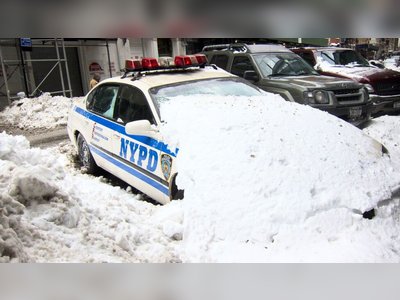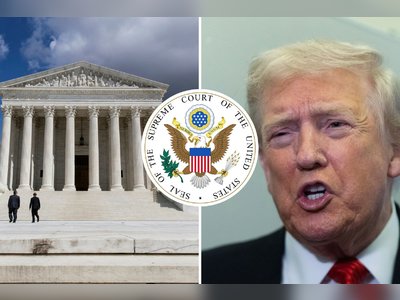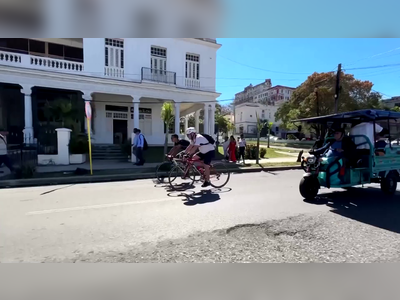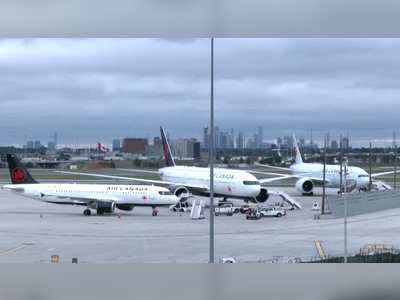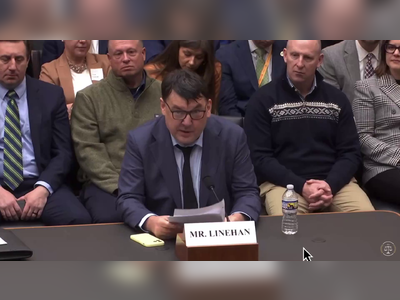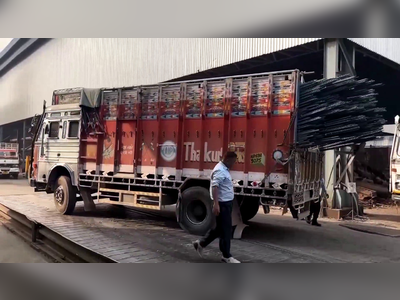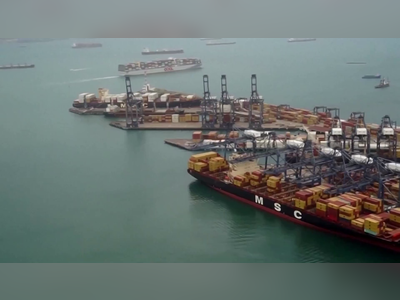Bethlehem’s Dire Christmas: A Silent Night as Gaza Conflict Grounds Tourism
The once vibrant city of Bethlehem faces a dark holiday season as Israeli-Palestinian tensions and economic woes extinguish its festive spirit.
In the heart of Bethlehem, a city immortalized as the birthplace of Christ, there is an eerie absence of the usual Christmas grandeur.
The Manger Square, typically shimmering with festive lights and bustling with pilgrims, now lies dormant under the shadow of the ongoing Gaza conflict and stringent Israeli-imposed movement restrictions in the occupied West Bank.
For the second consecutive year, Bethlehem's church of the Nativity—the city's historic and spiritual magnet—stands uncharacteristically quiet.
The solemn chants of a handful of Armenian monks echo through the hallowed hallways, in stark contrast to the thousands of visitors it usually hosts.
'Normally, you'd find 3,000 to 4,000 people inside the church during this time,' remarks Mohamed Sabeh, a security guard, his voice tinged with regret over the city's loss of its quintessential Christmas identity.
Despite Bethlehem's relative detachment from the direct violence, since the conflict erupted between Israel and Hamas on October 7th last year, the repercussions have been palpable.
The city's economy, heavily reliant on foreign tourists, is experiencing a severe downturn as international visitors shy away.
Even Palestinian visitors are deterred, hindered by increased Israeli security measures that exacerbate travel frustrations.
'Christians from Ramallah cannot come because of security checkpoints causing kilometer-long traffic jams,' Sabeh explains, highlighting the aggravation felt by those living under Israel's omnipresent military oversight.
Moreover, Bethlehem’s mayor, Anton Salman, has accused the Israeli army of heightening the obstacles with new barricades, further stifling access to the city.
The strained circumstances have transformed Bethlehem's Christmas celebrations from jubilant public spectacles to subdued religious observances.
The city will forgo parades and grand marches.
According to Mayor Salman, the idea of celebrating amidst such suffering would seem callous: 'We want to show the world that Bethlehem is not having a normal Christmas,' he states solemnly.
The economic impact is brutal, businesses are shuttered, and families grapple with financial uncertainty.
Joseph Giacaman, who runs a prominent shop at the Manger Square, admits to opening sporadically, 'just to clean,' owing to the lack of customers.
The sentiment is echoed by other local merchants facing an existential threat, with many families already losing their livelihoods.
Beyond Bethlehem, the mood in Jerusalem's Old City's Christian Quarter resonates similarly.
Even here, just a stone’s throw from the Israeli separation wall, traditional Christmas decorations remain conspicuously absent—as if reflecting a collective sigh of fatigue and demoralization.
This sense of malaise is driving an exodus.
Economic strife and security clampdowns in place since the war began prompt many to abandon Bethlehem.
Mayor Salman estimates that approximately 470 Christian families have emigrated over the past year, an exodus that spans beyond just the Christian populace, echoing a broader demographic shift.
Father Frederic Masson, a Syrian priest serving in Bethlehem, notes that the conflict has accelerated a longstanding trend.
Particularly affected are young people, disillusioned about their prospects in a city where 'hope is seized by political power.'
The pursuit of brighter futures propels locals toward greener pastures abroad.
Fayrouz Aboud, director of the French Alliance in Bethlehem, observes a rise in language course enrollments: individuals looking to equip themselves for life overseas amid speculations of West Bank annexation by Israel.
This palpable anxiety manifests in personal stories, such as those shared by Fayrouz Aboud, whose son has urged her to consider migration for safety.
'Let’s leave this place.
The Israelis will come and kill us,' he said, encapsulating the local despondency.
As Bethlehem braces for yet another festively barren Christmas, the city stands as a microcosm of broader geopolitical tensions and the human cost inflicted by protracted conflict.
It’s a poignant reminder that for some, the season of hope and joy has instead become a time of despair and reflection.
The Manger Square, typically shimmering with festive lights and bustling with pilgrims, now lies dormant under the shadow of the ongoing Gaza conflict and stringent Israeli-imposed movement restrictions in the occupied West Bank.
For the second consecutive year, Bethlehem's church of the Nativity—the city's historic and spiritual magnet—stands uncharacteristically quiet.
The solemn chants of a handful of Armenian monks echo through the hallowed hallways, in stark contrast to the thousands of visitors it usually hosts.
'Normally, you'd find 3,000 to 4,000 people inside the church during this time,' remarks Mohamed Sabeh, a security guard, his voice tinged with regret over the city's loss of its quintessential Christmas identity.
Despite Bethlehem's relative detachment from the direct violence, since the conflict erupted between Israel and Hamas on October 7th last year, the repercussions have been palpable.
The city's economy, heavily reliant on foreign tourists, is experiencing a severe downturn as international visitors shy away.
Even Palestinian visitors are deterred, hindered by increased Israeli security measures that exacerbate travel frustrations.
'Christians from Ramallah cannot come because of security checkpoints causing kilometer-long traffic jams,' Sabeh explains, highlighting the aggravation felt by those living under Israel's omnipresent military oversight.
Moreover, Bethlehem’s mayor, Anton Salman, has accused the Israeli army of heightening the obstacles with new barricades, further stifling access to the city.
The strained circumstances have transformed Bethlehem's Christmas celebrations from jubilant public spectacles to subdued religious observances.
The city will forgo parades and grand marches.
According to Mayor Salman, the idea of celebrating amidst such suffering would seem callous: 'We want to show the world that Bethlehem is not having a normal Christmas,' he states solemnly.
The economic impact is brutal, businesses are shuttered, and families grapple with financial uncertainty.
Joseph Giacaman, who runs a prominent shop at the Manger Square, admits to opening sporadically, 'just to clean,' owing to the lack of customers.
The sentiment is echoed by other local merchants facing an existential threat, with many families already losing their livelihoods.
Beyond Bethlehem, the mood in Jerusalem's Old City's Christian Quarter resonates similarly.
Even here, just a stone’s throw from the Israeli separation wall, traditional Christmas decorations remain conspicuously absent—as if reflecting a collective sigh of fatigue and demoralization.
This sense of malaise is driving an exodus.
Economic strife and security clampdowns in place since the war began prompt many to abandon Bethlehem.
Mayor Salman estimates that approximately 470 Christian families have emigrated over the past year, an exodus that spans beyond just the Christian populace, echoing a broader demographic shift.
Father Frederic Masson, a Syrian priest serving in Bethlehem, notes that the conflict has accelerated a longstanding trend.
Particularly affected are young people, disillusioned about their prospects in a city where 'hope is seized by political power.'
The pursuit of brighter futures propels locals toward greener pastures abroad.
Fayrouz Aboud, director of the French Alliance in Bethlehem, observes a rise in language course enrollments: individuals looking to equip themselves for life overseas amid speculations of West Bank annexation by Israel.
This palpable anxiety manifests in personal stories, such as those shared by Fayrouz Aboud, whose son has urged her to consider migration for safety.
'Let’s leave this place.
The Israelis will come and kill us,' he said, encapsulating the local despondency.
As Bethlehem braces for yet another festively barren Christmas, the city stands as a microcosm of broader geopolitical tensions and the human cost inflicted by protracted conflict.
It’s a poignant reminder that for some, the season of hope and joy has instead become a time of despair and reflection.
